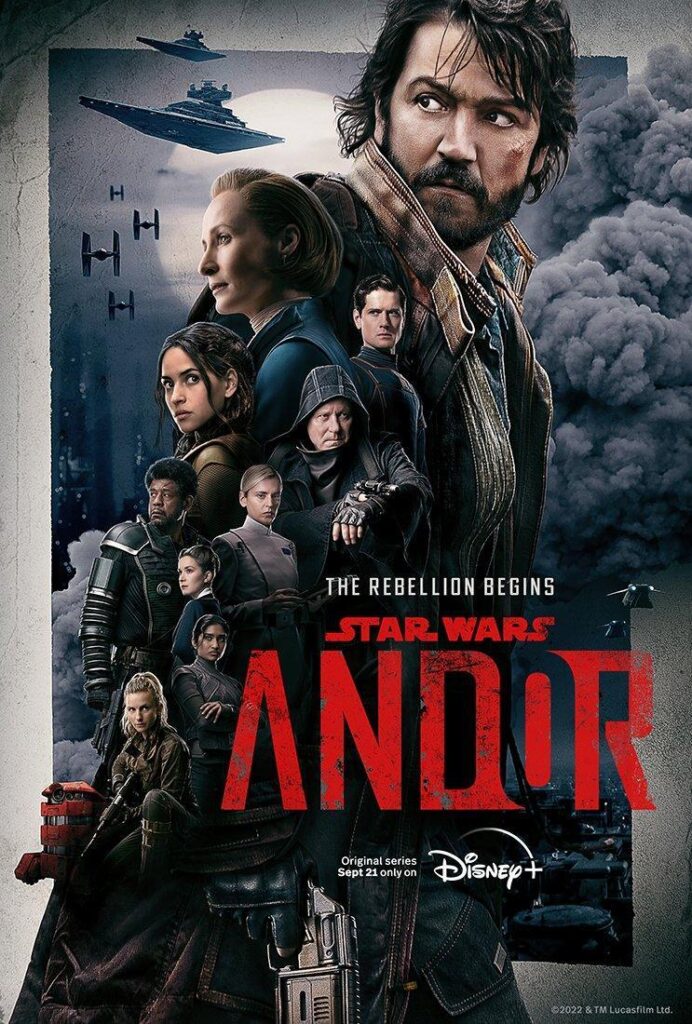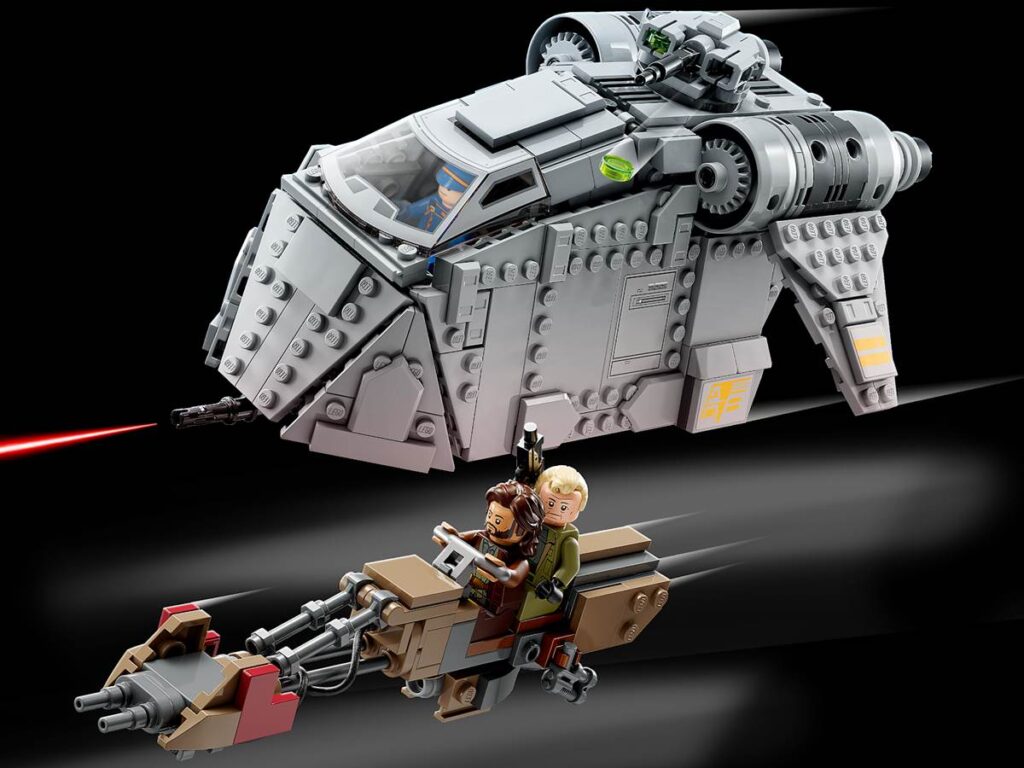”Andor” asks, can a Star Wars experience without humor or padawans who hate sand entertain a rabid fanbase desperate for a good Star Wars show?
Genre: Sci-Fi Fantasy (TV show)
Premise: After a thief kills two employees from a large corporation while looking for his missing sister, he becomes hunted by the company on the backwater planet where he lives.
About: It’s finally here! Andor, the series. I’ve talked about it endlessly on the site. Tony Gilroy, who reportedly saved Rogue One from original director, Gareth Edwards, was gifted this show as his reward by Lucasfilm head, Kathleen Kennedy. Despite Gilroy insulting poor Star Wars every chance he gets and making the world’s most confusing statement about how the timeline in “Andor” is going to work, the show finally debuted today.
Writer: Tony Gilroy
Details: This review is for the first 3 episodes, which are each about 30 minutes.

Let us start by stating the obvious.
Before this series was announced, nobody was asking for a Cassian Andor show.
Which makes you wonder why they wanted to make it so badly. Lucasfilm has become infamous for terminating in-development Star Wars projects. So why were they so determined to get this one to the finish line?
Who knows? Most of you will probably say, “Who cares? As long as the show is good.”
To this, we can agree. I may not have asked for Andor but you can bet Chukhuh-Trok’s hunting spear that I’d love to be proven wrong. Probably more than anyone on this planet, I want to love a Star Wars show. And, from what we’ve been told, this show was made more for my demographic than any Star Wars project yet.
Are we ready for this?
Okay, let’s dig into Andor!
We meet Cassian Andor on some planet run by what Amazon might look like in a thousand years. Andor heads to a brothel where he appears to be looking for his sister, who may have worked here at one point. He doesn’t get any information on her so he leaves, and is immediately confronted by a couple of drunk-with-power Amazon employees. He quickly kills them both. Take that, Bezos!
Andor then heads back to his current planet of residence where he’s putting together some plan that is so secretive even the audience is not allowed to know it. In between scenes of him sneaking around and never allowing his voice to rise above 3 decibels, we cut back to when he was a kid on some planet living with a bunch of other kids and they discover a crashed ship.
Back at Amazon, a middle management type wants to sweep these employee murders under the rug. But a young ambitious dude in the company wants to kill the murderer in the hopes of propelling himself up the company ladder. So he recruits a dozen soldiers and heads off to Cassian’s planet to find him.
Cassian’s super-secret plan finally reveals itself when he meets with a mysterious rich guy named Luthen Rael. Cassian thinks he’s selling Luthen a star-thingamacalit, after which he’ll use the money to escape to some place far away. But it turns out Luthen has other plans for Cassian. Seeing how crafty this guy is, he wants to recruit him into his shadowy organization. Cassian has to make a decision fast – yes or no? He decides ‘yes,’ and that is the end of our third episode.

I was worried about two things going into this show.
1) That Cassian Andor isn’t a very interesting character.
And…
2) That this show would be way too serious.
I am sad to report that “Andor” confirmed both of these fears. Much like Tion Medon’s infamous botched dental visit, it’s a big fat whiff on each front.
Cassian is boring. He’s active, which is good. But if we never understand what our character is being active for, it doesn’t really matter. Being ultra-mysterious about who your main character is is one of the riskier moves in screenwriting. Because you’re basically saying, “You must like my character even though you know nothing about him or what he’s doing.”
There are examples of this working but they’re few and far between.
On top of this, the show is more serious than Emperor Palpatine when he’s drawing up his latest galaxy takeover. I think there were two attempted jokes in 100 minutes. And they were highly neutered. This is something I tried to warn the Star Wars fan base about. If you go super dark with Star Wars, it’s no longer Star Wars. An essential component of Star Wars’s makeup is fun. And this show is about as fun as when Malakili watched Luke kill his pet Rancor.
The closest to fun we get is the droid, B2EMO, and while I’d anoint him as my favorite character in the series so far, he’s got five minutes of screen time.
So is there anything good about this show, Carson?
I’ll say this. The dialogue is way better than any of the other Star Wars shows. There’s a level of sophistication you’re not used to seeing in this franchise. For example, there’s a scene where Andor comes to a work friend and asks him to provide an alibi for why he wasn’t at work earlier.
The dialogue is not framed in a clunky on-the-nose manner where Andor says something like, “I need you to help me with an alibi. I flew off to another planet which is why I missed work and now I need you to tell Boss Doug that I was hanging out with you.”
Instead, the dialogue is framed as if it really happened. So Andor immediately jumps in with, “I was at your house yesterday. We drank all night. You got mad at me because I bought cheap liquor.” “I would’ve yelled at you for bringing cheap liquor. We were drinking [different booze] instead.” In other words, they set up the alibi by speaking as if it really happened rather than asking for help and then coming up with a story together.
With dialogue, you’re always looking for ways to make the exchange different somehow. You want to avoid straightforward, Character A: “This is what I have to say,” Character B: “And this is how I respond to that” dialogue if possible. You could tell Gilroy is a step above all these newbie screenwriters that Star Wars has been hiring to write their shows. At least in the dialogue department.
Ironically, that same knowledge hurts Gilroy in the storytelling department. What usually happens when you get older as a writer is you show more restraint. You don’t feel the need to constantly titilate the audience every scene. You trust yourself and therefore take your time setting up the bigger plot developments.
But what sometimes ends up happening is you cross the Rubicon and show so much restraint that huge chunks of scenes go by without any payoff. We’re watching you setup and setup and setup and setup and it’s like, “Dude! Give us something for all the hard work we’re doing!”
I get the impression that Gilroy is playing to the highest common denominator here – the 60 year old intelligent veteran moviegoer who’s seen it all and is, therefore, willing to make the trek down Patience Lane. It’s a risky game to play in a franchise built off a never-ending supply of entertaining moments.
I would not have watched Episode 2 if they had only posted the first episode on Disney Plus today. I wouldn’t have even watched Episode 3 if they’d posted the first two episode on Disney Plus today. That’s how slow the story develops.
To Gilroy’s credit, all the things he was setting up in episodes 1 and 2 start to pay off in episode 3. This is the episode where the Amazon Corporation sends their soldiers to Andor’s planet to find and kill him. Gilroy did a really good job building up to this confrontation. What I enjoyed most about it was he made the whole thing just as scary for the Amazon soldiers as he did the locals. These soldiers are inexperienced. They’re 12 in a city filled with thousands of people. At any moment, if the people decide to revolt, they’re screwed.
That combined with the mystery of where Andor was going and who he was meeting created a tense atmosphere throughout the episode. It helped me see the potential of the series I was unconvinced it possessed in the first two episodes.
This has led me to a very confused place going forward with Andor, and with Star Wars in general. The Obi-Wan Kenobi show was a mess. Those rookie writers shouldn’t have been let anywhere near a franchise this big. The Boba Fett show was some of the worst writing I’ve seen on a show with that kind of budget. The Mandalorian is uneven but has some good episodes. It’s written well at times.
I would say that Andor is the most sophisticated written Star Wars show by far. I’m just not sure that’s showing the dividends it needs to after three episodes. Clearly, Gilroy knows how to write a scene. But is his overarching narrative as compelling as he thinks it is? I’m not sure. And is his main character as interesting as he thinks he is? Probably not.
I think this begs the question: Does Gilroy mesh with the Star Wars brand? Or is he pulling a Rian Johnson, where you hijack a franchise to tell the story you want to tell rather than the story that’s right for the franchise?
I’ll probably check back in with you guys at the season midpoint to give you better answers to those questions. In the meantime, tell me what you thought of Andor.
[ ] What the hell did I just stream?
[x] wasn’t for me
[ ] worth the stream
[ ] impressive
[ ] genius
What I learned: Andor is yet another example of why all writers should seriously reconsider adding flashbacks to their story. We saw this in Boba Fett with the silly sand people flashbacks. We see it here with all this time spent on Cassian’s childhood that doesn’t tell us anything we couldn’t have already imagined ourselves. You have to ask the question, is what the flashbacks give you worth the momentum-stoppage they take from you? In this case, the answer is clearly no. The flashbacks dragged along. I’ll never say never. But, in my experience, flashbacks almost always take more from the story than they give.

